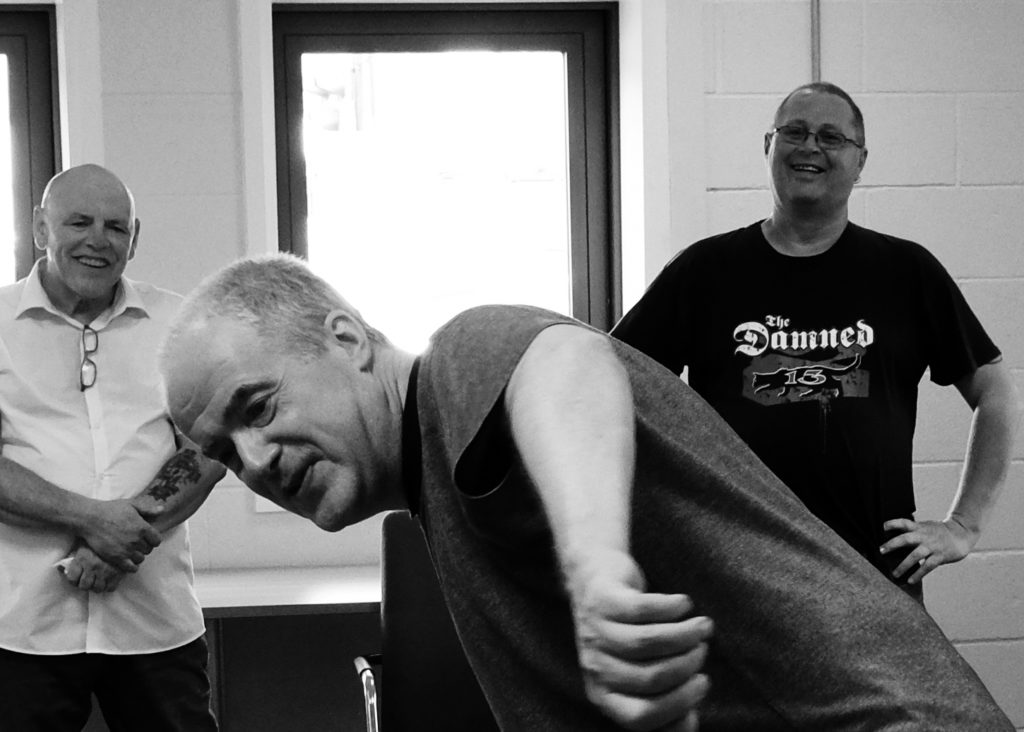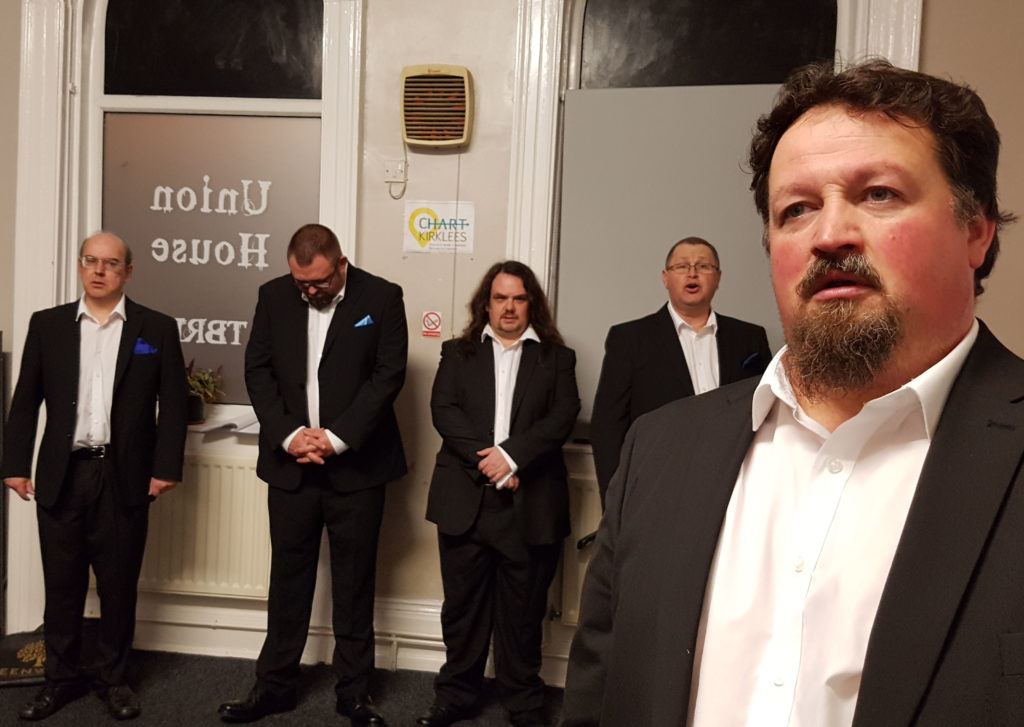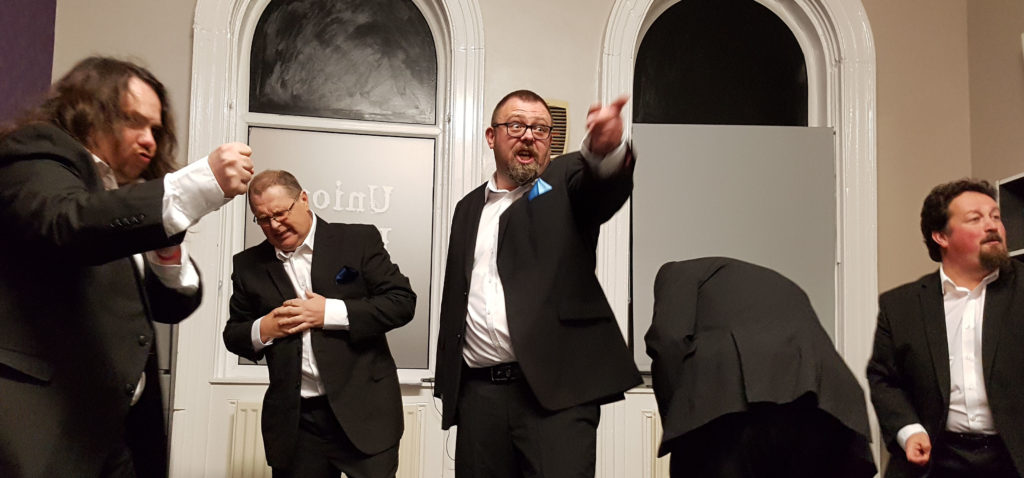Applied Theatre : Men and Mental Health
Applied Theatre is the practice of using theatre and drama in non-traditional settings and/or with marginalized communities. It encompasses theatre practices that tackle areas of social and cultural policy such as public health, education, housing, social welfare, and juvenile and criminal justice.
I have been making theatre with marginalised groups since 1990, primarily working with groups of older young people, care leavers, young parents, young offenders, young refugees and asylum seekers, young carers and looked after children and young people. I developed my practice in youth work settings, developing projects and programmes that used the arts and creativity to deliver youth work outcomes: increased confidence, participation and transferable skills.
Central to my work was developing performances that reflected the views of those taking part and in creating platforms where their voices might be heard.
One of my former roles was Director of the National Association of Youth Theatres, for this role I worked in partnership with Action for Children, developing and delivering ARTiculation, their flagship participation programme allowing young people to create performances which reflected their views on government policies and programmes and their personal experiences of using services.
In March 2018, I was appointed as the Men’s Engagement and Development Worker at CLEAR, specifically to work on a community based performance project in the Kirklees area.
It was agreed that during my twelve month appointment I would engage men in a creative process, using theatre, to enable them to explore their lived experience of mental health issues and to create a performance that tells their stories.
Making theatre is not what most men do. Taking part in theatre workshops is outside of most men’s experience. For most men, theatre is not part of their lives. For men with mental health issues – social anxiety, depression and paranoia – performing in front of an audience might not seem the natural thing to do.
So why do it?
I believe that the process of making theatre can be life changing; it increases people’s confidence and creates a safe environment where people can take risks, explore issues that affect their lives, share stories, play and laugh.
But how was I going to convince predominantly white, working class male, with experience of mental health issues to take part in the project?
I went out and I spoke to them.
I attended men’s groups at CLEAR and Andy’s Mans Clubs, I contacted other mental health service providers and spoke to the men they worked with.
I’m a man, I needed a plan, I needed something that I could give to men who might be interested. I needed something which was specific and relevant to the men I was talking to.
I engaged the Dewsbury Men’s Group to be my “models” for the marketing materials and spent an evening with the group, taking photographs, explaining that I was going to use them to create silhouettes to use on posters and postcards to advertise the project. I met the group the following week and showed them how I had created silhouettes in Photoshop and incorporated them in to a number of designs. They discussed the examples I showed them – the colours, font, words and decided on their favourite. I re-visited the other men’s groups asking them to comment on the postcard design and project idea.
I still hadn’t asked anyone to get involved.
I got the postcards printed – “Men’s Talk” – a performance project for men who have experienced mental health issues” – detailing two taster workshops, one in Huddersfield, the other in Dewsbury.
I went back to the groups and gave out the postcards. I told the men that their only commitment would be to attend one workshop and that if they hated it, I would never mention it again.
The men in Dewsbury, who had modelled for me, looked at each other and somehow agreed that they would all give it a go!
Men’s Talk is planned as a nine month long pilot project comprising a series of half day weekly sessions in the first phase, followed by a devising process, leading to the development of an original script, a rehearsal and performance programme. At the end of the project, the men evaluate it and celebrate their achievements.
During the first six weeks, the focus was group building, confidence building and skills development. Above all, it needed to be fun, it needed to be engaging.
During May and June, 24 men took part in weekly theatre workshops in both Huddersfield and Dewsbury.
I have worked with poorly motivated young people, I have spent long days trying to convince people to join in however I had no such trouble with the men – they gave everything a go!
Each session began with tried and tested ice-breakers, included stretching and physical exercise, breathing techniques, drama games, trust exercises, lots of laughing and we always finished with a song.
They kept coming back. They talked about making new friends, trying things they never had before and about how different it was from other the other mental health focussed groups they attend.
I was quite surprised by some of those who chose to attend. Men who spoke openly about their anxiety issues were recognising the benefits of attending the workshops, men who were socially isolated had found something else to fill their time. Others talked about finding purpose. They all talked about how much they laughed!
I on the other hand, had worries. Some of the men were so far away from being able to perform on stage that they were never going to be able to complete the project, yet were clearly benefitting from the workshop stage.
Inevitably, as the project moved in to the next stage, numbers began to fall. The emphasis changed from confidence building and skills building, to surfacing and shaping the material we would use in the performance. For some of the men, the idea of getting up on stage was a step too far.
Twelve men were involved in the devising stage, which led to the development of the final script.
These sessions ran over six weeks and extended to full days. This proved, initially, very challenging for the men, who were not used to working or concentrating for extended periods.
Using theatre techniques we explored depression and anxiety, isolation, suicide and explored their experiences of living with a mental health condition, what had worked and what hadn’t and found a common language that enabled the men to discuss the reality of their lives.
It was an emotional journey, with the men opening up about their experiences and sharing their thoughts and feelings, openly and honestly.
The men were enjoying what they were doing but were also aware that exploring mental health was impacting on them outside of the sessions. They talked about how, as a result of the project, they were thinking more about their mental health and re-visiting their own stories.
I had deliberately structured the workshops to finish on a positive note, leaving anything negative back in the space, but there was growing anxiety as we approached the performance stage.
We’d been invited to perform at the World Mental Health Day event at the John Smiths Stadium, Huddersfield. This would be the first time the men had been on stage.
We had more drop outs, someone got a job, another started a training course – for some, it was just too much. In the end we had six performers.
Two weeks before the performance I sat down with everyone and told them we didn’t have to do it. I was worried that the additional anxiety of performing in front of an audience might be too much. But they were having none of it! They were determined to continue.
The week before the performance we discovered that the performance venue had changed due to the demand for tickets. Now instead of performing to an audience of 100, it was more likely to be closer to 300!
The event, which was organised by Kirklees MDC, included speakers from Rugby League’s State of Mind and Andy’s Mans club before finally, the Men’s Talk men stepped on stage.
In “Men’s Talk” no-one tells their own story. Though the stories and characters on stage are fictional, their stories are shaped form the men’s own words that they shared in the theatre workshops.
They were fantastic. They held the audience. They never dropped a line. They came off to rapturous applause.
The feedback was very positive: “Very professional” “Insightful, powerful, useful”
For the men involved, it wasn’t just about the performance. Although they talked about buzzing after they came off stage, when they reflected on the process they all talked about the new friendships they had made, about how they felt they had achieved something they never thought they would, how the project had taken them to new places, given them new skills and a real sense of purpose and belonging.
One of the men wrote: “Thanks to your project, I actually feel to be wanted in this world and to belong to something that is worthwhile…. I have not felt like that for a very long time”.
The script has had a re-write since its first outing. We are back in rehearsal with further performances planned for in Kirklees and Leeds.
For further information about Men’s Talk, contact Stuart Hawkes, Community Links Engagement and Recovery Service: stuart.hawkes@commlinks.co.uk





